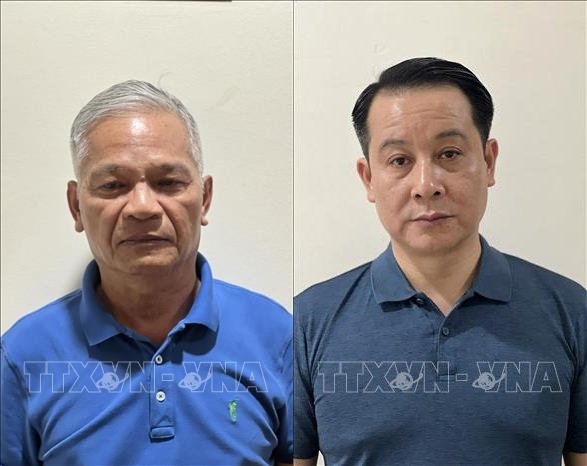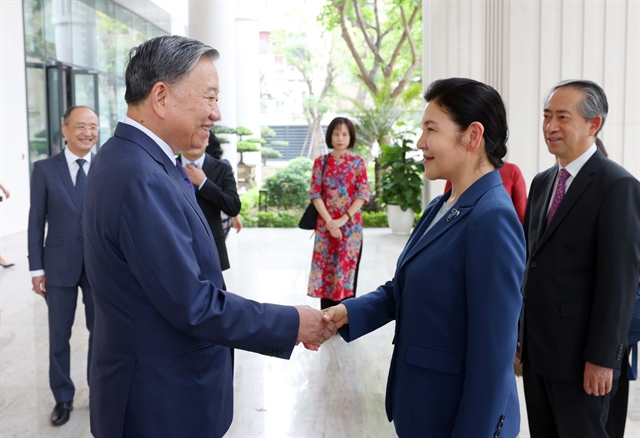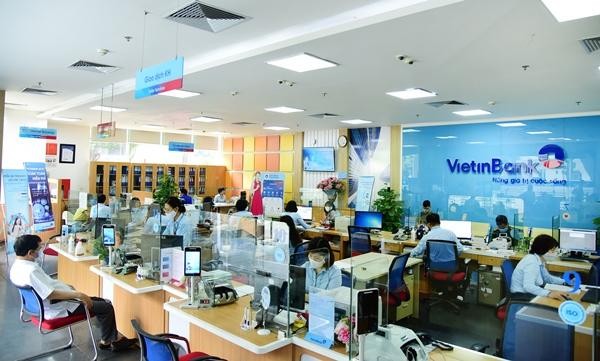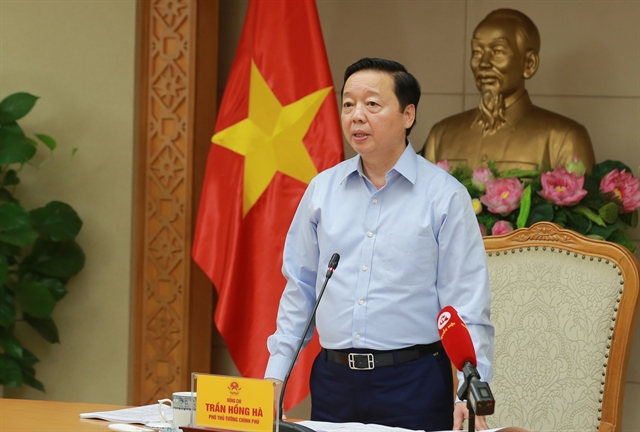

A family in Bắc Giang province are the champions of giving blood. By doing so, the Lê family have become closer to one another.
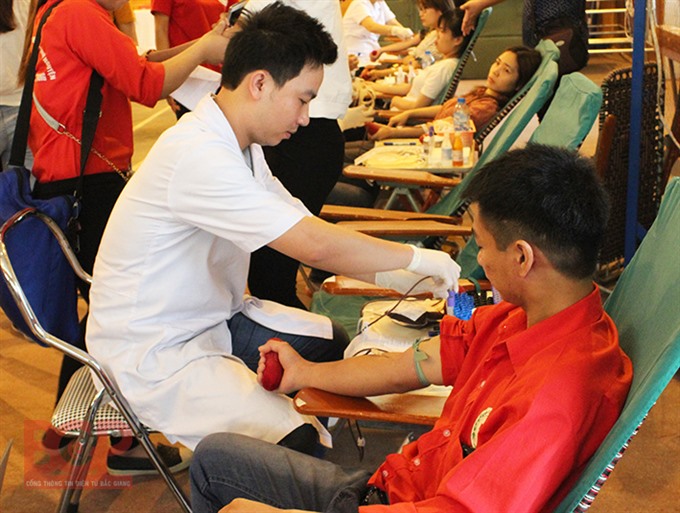 |
| Blood donation has become a tradition of many families in rural Bắc Giang province. In 2017, the Tiên Lục Commune donated a total of 203 units of blood. — Photo syt.bacgiang.gov.vn |
A family in Bắc Giang province are the champions of giving blood.
By doing so, the Lê family have become closer to one another.
They are a big family in the province.
They and their ancestors have lived there for around two hundred years.
By Nguyễn Trường
The Lê family have been living in Tiên Lục Commune for more than 200 years. They are not only one of the biggest families, but also one of the biggest blood donating groups in the locality.
“When we donate blood, we take more than what we give. We get a free health check, our family bonds are strengthened and we also enjoy the reward helping others in need,” Lê Văn Phùng, a member of the family, said.
“Unfortunate incidents can happen to anyone at any time. For many people, the line between life and death becomes very thin and all that they desperately need is blood. By donating blood, we can save their lives,” said Phùng.
There are four families in Tiên Lục who are frequent donors - the Le, Nguyễn Văn, Nguyễn Đình and Trần Văn. Each family donates a total of about 50 units of blood (each equivalent to 250ml) every year. In 2017, the whole commune donated a total of 203 units.
Phùng said family meetings, reunions, funerals and ancestor commemoration were chosen for "communication work" as he describes blood donations.
In rural areas, it is customary for families to hold a year-end meeting to sum up the achievements for the 12 months, including children’s studies or the construction of a commemoration structure for the whole family.
In recent years, reports on blood donations have also become part of discussion and frequent blood donors are honoured.
The Lê family is one of the biggest families in the region with more than 300 households. The family started donating blood eight years ago.
“Initially people had little understanding about blood donations. Locals thought that by donating blood they would lose the nutrients in their body,” Phùng said.
It was a common belief that a drop of blood was equivalent to nutrients contained in six bowls of rice.
Phùng joined the commune’s Red Cross group and tried to change this perception through research and reading newspapers. He found out that blood donations did not harm the donor’s health, but they did help save other people’s lives.
He first encouraged his own small wife and children to donate blood. They were all excited about the idea. Blood donation became a topic of discussion in his family and the spirit spread quickly to other relations.
Nguyễn Đình Lâm from the commune still vividly remembers first donating blood in 2008 while attending a training class in Bắc Giang city. At the beginning, he felt a bit worried and unsure, yet after the volunteers explained, he joined in. After donating blood, he felt "more healthy and refreshed" because he felt glad that his blood would be used to save other people.
Lâm has donated blood twice a year for more than eight years. Apart from Lâm, English teacher Nguyễn Đình Phúc has also donated blood regularly since 2005.
Lâm said that people in his big family donated blood in the hope of saving people in need. "When we meet at the end of the year, blood donors are honoured. This is a big motivation for us.”
According to Lê Văn Tiến, head of Tiên Lục commune’s Red Cross, there is even a competition between four of the big families to see which can donate the most. All want to have the honour.
“We are proud of families that have many blood donors because it means that the family is healthy. The locals here donate blood voluntarily. Every time they go, the clan rents a car for them to travel to the blood collection location. They use "attendance money" they received to hold small party together,” said Tiến.
Trần Văn Độ from Hiệp Hòa District in Bắc Giang Province, an exemplary blood donor, was one of the first to help.
In 2006, this mountainous district with a population of only 200,000 had a total of 256 units of blood in storage.
“It was hard at first, as the perception of locals on blood donation was generally negative. Many leaders didn’t encourage their staff to donate blood, some families would not encourage their children,” said Độ.
Yet Độ was determined to change the perspective. He asked the local authority to hold training classes with trainers from the Institute of Haematology and Blood Transfusion to raise awareness of local people and civil servants. He also went to communes to talk to locals and give them advice.
Since 2011, the amount of blood donated in Hiệp Hòa has leapt to an average of 1,600 units per year.
“Hiệp Hòa has a high number of blood donors and Độ played an important role in this achievement,” said Ma Thị Thìn Nga, head of the provincial Red Cross. — VNS
GLOSSARY
“When we donate blood, we take more than what we give. We get a free health check, our family bonds are strengthened and we also enjoy the reward helping others in need,” Lê Văn Phùng, a member of the family, said.
Bonds are invisible ties that keep people together.
There are four families in Tiên Lục who are frequent donors - the Lê, Nguyễn Văn, Nguyễn Đình and Trần Văn. Each family donates a total of about 50 units of blood (each equivalent to 250ml) every year. In 2017, the whole commune donated a total of 203 units.
Frequent donors are people who give, often.
Phùng said family meetings, reunions, funerals and ancestor commemoration were chosen for "communication work" as he describes blood donations.
Reunions happen when people who have not seen one another for a long time get together.
A commemoration is a celebration.
Communication means sending messages between people through talking or writing.
In rural areas, it is customary for families to hold a year-end meeting to sum up the achievements for the 12 months, including children’s studies or the construction of a commemoration structure for the whole family.
Rural means country.
Customary means the way people do things while following their traditions
“Initially people had little understanding about blood donations. Locals thought that by donating blood they would lose the nutrients in their body,” Phùng said.
Initially means “at first”.
Nutrients are substances in food that help the body grow.
It was a common belief that a drop of blood was equivalent to nutrients contained in six bowls of rice.
Equivalent means “much the same as”.
Phùng joined the commune’s Red Cross group and tried to change this perception through research and reading newspapers.
A perception is the way people see and understand something.
Blood donation became a topic of discussion in his family and the spirit spread quickly to other relations.
A topic is a subject.
A topic for discussion is a subject to talk about.
Spirit, in this case, means mood.
Nguyễn Đình Lâm from the commune still vividly remembers first donating blood in 2008 while attending a training class in Bắc Giang city.
Vividly means “in a lively way”.
This is a big motivation for us.”
A motivation is something that encourages others to want to do something that is usually positive.
“Every time they go, the clan rents a car for them to travel to the blood collection location. They use "attendance money."
A clan is a big family, including cousins, uncles, children, grandparents and others.
Trần Văn Độ from Hiệp Hòa District in Bắc Giang Province, an exemplary blood donor, was one of the first to help.
Exemplary means very good.
Yet Độ was determined to change the perspective.
To be determined means to work hard towards something you want.
He asked the local authority to hold training classes with trainers from the Institute of Haematology and Blood Transfusion to raise awareness of local people and civil servants.
Haematology means the study of blood.
Blood transfusion means taking blood from one person and giving to another person.
Civil servants are people who work for the government.
WORKSHEET
State whether the following sentences are true, or false:
ANSWERS: 1. True; 2. True; 3. True; 4. True; 5. False.

